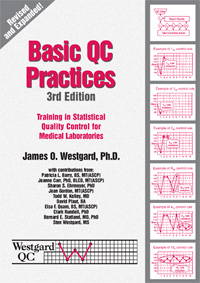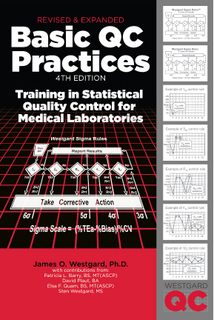Basic QC Practices
QC - The Records
Tricia Barry MT(ASCP) gives us another valuable article on the basics of quality control, explaining the who, what, when and how of recording your QC history -- plus the why we need to do it. It turns out your records are important - they provide a voice for the method. If you listen closely, you'll understand why things are out-of-control sometimes.
QC - The Records
To read the most up to date version of this lesson, we invite you to purchase the Basic QC Practices manual, Fourth Edition, or join the Basic QC Practices online course.
- Keeping the History - The Why
- Recording the History - The What
- Recording the History - The How
- Recording the History - The Who
- Learning from History
- References
The words "documentation" and "records" often give people a negative feeling, so let's get rid of that right away. Let's think about "history" rather than documentation. We know we can study history and learn from the past, from the successes of others, and also their failures. Many times the failures are even more useful than the successes because they can help us understand what went wrong, the nature of the problem, and what the causes might have been. Likewise, we can learn from the history of a laboratory testing process. It can help us solve today's problems and prevent tomorrow's problems!
The history is kept in various records. I like to think of these records as "voices" of the process - each one telling us something about what is or has been going on. The voices tell us about the performance when a method was first evaluated, when daily quality control and proficiency testing samples were tested, the frequency and type of problems encountered under routine conditions, and what changes were needed to correct problems or improve operation. We may not need to look at all the records every time a problem needs to be solved. However, listening to several "voices" simultaneously allows us to see a process in context and, thereby, make better decisions about waht to do to improve. You know the old saying "There are always [at least] two sides to every story." Let's listen to all the "voices" of the process.
Keeping the History - The Why
The history of an analytical process should include all the information (generated in the normal operation of that process) necessary to describe performance and to identify factors that affect performance. This information is recorded on paper or in electronic format, usually in chronological order, thereby giving a "history" of the process. This history provides a core of facts about the process and its performance under both stable and unstable conditions, including evidence of quality -- or the lack thereof. It can be used to describe past performance and current performance, to aid immediate troubleshooting and corrective action, and to guide future improvements.
 We invite you to read the rest of this lesson
We invite you to read the rest of this lesson
To read the entire, updated version of this article, we invite you to purchase the Basic QC Practices manual, Third edition, or join the Basic QC Practices online course.
